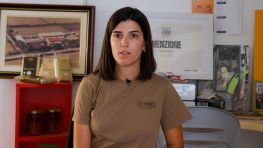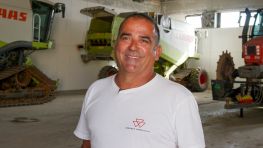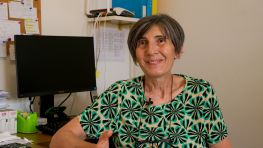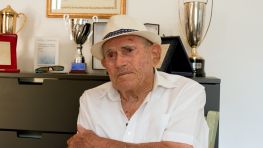 Rosalia Vacca and the Dream of…
Rosalia Vacca and the Dream of… Claudio Cirio
Cascina Falasco
Claudio Cirio, born in 1956, is the owner of Cascina Falasco, a rice farm that can count on three hundred hectares of land located in the municipality of Casalbeltrame. Initially destined for a career as a surveyor, he then followed in the footsteps of his ancestors. Claudio is in fact in the sixth generation of farmers specialized in rice growing. Claudio is also a partner of Sa.Pi.Se. (Sardo Piemontese Sementi) a seed company that produces and selects new varieties of seeds. Claudio talks about the characteristics of rice growing in Northern Italy, the main European center specialized in the cultivation of rice but also the northernmost region in the world where the white cereal is produced.
Video table of contents
- Presentation, six generations of farmers.
- Cascina Falasco, origin of the name.
- 300 hectares of rice.
- Training and career path.
- Sa.Pi.Se.
- The flowering of rice.
- Our production per hectare compared to the Sardinian one.
- How Sa.Pi.Se. works.
- History and characteristics of rice cultivation in the Po Valley.
- Italy European leader in the production of rice.
- Le aziende sementiere: Italia leader e le sementi storiche,
- In Italy many varieties but few actually grown.
- Carnaroli, the king of risotto.
- Create a new improving variety.
- The rice blast fungus: the most terrible disease of rice.
- Varietal groupings.
- The company shop at the time of COVID - 19.
- The colorful and aromatic rice.
- Ermes, the red rice.
- Our aromatic rice.
- In Italy 5kg of rice per year per person. A country divided between North and South.
- The doctor's "white rice".
- Rice and milk.
- Paniscia and panissa.
- Sunday risotto with the family.
- I speak with rice.
- Rice does not have the gift of speech but you have to know how to listen to it.
- Innovation and tradition.
- The Chinese and rice husking.
- If my grandfather could see today's rice paddy...
- Don't start the rice harvest on Monday!
- Producing the rice seed.
- Rice in the courtyard.
- The memory of the "mondine".
- Avoid chemistry.
- The last horses.
- Less chemistry, cleaner.
- We farmers are the first to be in contact with chemistry.
- Controls on the use of prohibited substances.
- The rice of tomorrow. Today it feeds billions of people and will be even more present on our tables.
Interview information
Country: IT
Region: Piemonte
City: Casalbeltrame
Suburb: Falasco
Locality: Falasco
Document by: Ghiardo Luca
Video by: Porporato Davide, Ghiardo Luca
Created: 26-03-2021
Questo video fa parte del seguente archivio
Rice stories
Rice stories
Food is a fundamental resource for man and his health, both through the supply of nutrients and the ability to embody traits of human culture that play a leading role in our well-being.
Over time, each territory has built original ways in which to relate to the fruits of its land, enriching them with rituals, symbolic meanings and culinary customs. Much of these relationships have been lost following the years of the economic boom, with the exodus from the countryside to urban centers, with the advent of agriculture for mass production and ultimately with the globalization of markets and the consequent impoverishment of the heritage of biodiversity and ethnodiversity.
The purpose of this archive is to collect evidence relating to the main rice production area in Europe, that is the Po Valley, and to investigate, through the analysis of textual sources and testimonies collected in the field, both what survives of this heritage, and the ways in which which has evolved and reached us, paying particular attention to the explicit and implicit links that bind food and health.






